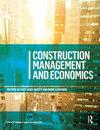Critical essay: sociotechnical construction
IF 3.3
Q2 BUSINESS
引用次数: 0
Abstract
The Houses of Parliament Restoration and Renewal Programme is the UK’s largest ever. The cultural value, funding model, risk profile, and fragility of the building exposes an uncomfortable truth. Construction business-as-usual has become an enterprise risk. Current levels of productivity, health, and wellbeing are not acceptable on a project of such high national importance. The Programme joins calls made in the Farmer Review, Project 13, the Construction Play Book , and now the Building Safety Bill for transformative change. It is in the unique position of being able to proactively drive this change. It is an exemplar project intended to deliver a learning legacy for the sector at large. It is also the first project to show an interest in a new approach called Sociotechnical Construction. The focus of this new approach is the joint optimization of socio/human and technical/organizational factors. The evidence points to these being instrumental in resolving the construction sector’s long-standing productivity and wellbeing paradox. This critical essay describes and defines Sociotechnical Construction, sets out the call to action, and presents the case for why it is needed now.评论文章:社会技术建构
议会大厦修复和重建计划是英国有史以来规模最大的。建筑的文化价值、融资模式、风险概况和脆弱性暴露了一个令人不安的事实。千篇一律的施工已成为企业风险。目前的生产力、健康和福利水平对于一个如此重要的国家项目来说是不可接受的。该计划加入了《农民评论》、《13号项目》、《建筑手册》以及现在的《建筑安全法案》的呼吁,以实现变革。它处于一个独特的位置,能够主动推动这一变化。这是一个范例项目,旨在为整个行业提供学习遗产。这也是第一个对一种叫做社会技术建构的新方法感兴趣的项目。这种新方法的重点是社会/人力和技术/组织因素的联合优化。有证据表明,这些措施有助于解决建筑行业长期存在的生产力和福利悖论。这篇批判性的文章描述和定义了社会技术建设,提出了行动呼吁,并提出了为什么现在需要它的案例。
本文章由计算机程序翻译,如有差异,请以英文原文为准。
求助全文
约1分钟内获得全文
求助全文
来源期刊

Construction Management and Economics
BUSINESS-
CiteScore
7.50
自引率
14.70%
发文量
58
期刊介绍:
Construction Management and Economics publishes high-quality original research concerning the management and economics of activity in the construction industry. Our concern is the production of the built environment. We seek to extend the concept of construction beyond on-site production to include a wide range of value-adding activities and involving coalitions of multiple actors, including clients and users, that evolve over time. We embrace the entire range of construction services provided by the architecture/engineering/construction sector, including design, procurement and through-life management. We welcome papers that demonstrate how the range of diverse academic and professional disciplines enable robust and novel theoretical, methodological and/or empirical insights into the world of construction. Ultimately, our aim is to inform and advance academic debates in the various disciplines that converge on the construction sector as a topic of research. While we expect papers to have strong theoretical positioning, we also seek contributions that offer critical, reflexive accounts on practice. Construction Management & Economics now publishes the following article types: -Research Papers -Notes - offering a comment on a previously published paper or report a new idea, empirical finding or approach. -Book Reviews -Letters - terse, scholarly comments on any aspect of interest to our readership. Commentaries -Obituaries - welcome in relation to significant figures in our field.
 求助内容:
求助内容: 应助结果提醒方式:
应助结果提醒方式:


